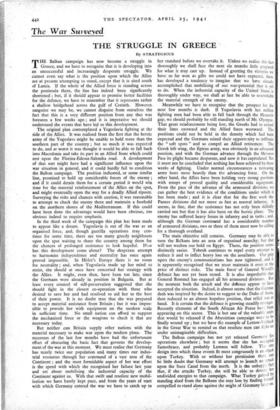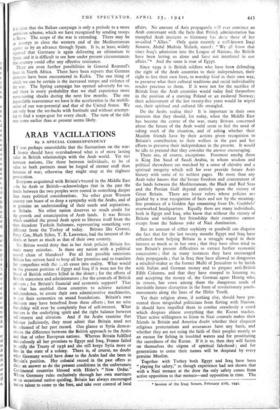The War SurveNed
THE STRUGGLE IN GREECE
By STRATEGICUS
THE Balkan campaign has now become a struggle in 1 Greece, and we have to recognise that it is developing into an unsuccessful and increasingly desperate struggle. We cannot even say what is the position upon which the Allies are at present attempting to stand, except that it is sited south of Lamia. If the whole of the Allied force is standing across the peninsula there, the line has indeed been significantly shortened ; but, if it should appear to promise better facilities for the defence, we have to remember that it represents rather a shallow bridgehead across the gulf of Corinth. However.- sanguine we may be, we cannot disguise from ourselves the fact that this is a very different position from any that was foreseen a few weeks ago ; and it is imperative we should understand the events that have led to this development.
The original plan contemplated a Yugoslavia fighting at the side of the Allies. It was realised from the first that the heroic army of the Yugoslays might be unable to hold more than the southern part of the country ; but so much it was expected to do, and at worst it was thought it would be able to fall back into Macedonia and take its part in an Allied front which could rest upon the Florina-Edessa-Salonika road. A development of that sort might have had a significant influence upon the war situation in general, and it could hardly fail to condition the Balkan campaign. The position indicated, or some similar line, promised to hold up considerable forces of the enemy ; and if it could detain them for a certain period it would win time for th,e material reinforcement of the Allies on the spot, and might eventually open the way for a deadly Allied riposte. Surveying the risks and chances with caution, it was reasonable to attempt to check the enemy there and maintain a foothold on the northern shores of the Mediterranean. If this could have been done the advantage would have been obvious, too obvious indeed to require emphasis.
In the third week of the campaign this plan has been made to appear like a dream. Yugoslavia is out of the war as an organised force, and, though guerilla operations may con- tinue for some time, there are too many greedy neighbours upon the spot waiting to share the country among them for the chances of prolonged resistance to look hopeful. HOW has this development come about? The desperate attempt to harmonise independence and neutrality has once again proved impossible. In Hitler's Europe there is no room for neutrality ; and, when Yugoslavia made up her mind to resist, she should at once have concerted her strategy with the Allies. It might, even then, have been too late, since the Gertnans were already in position in Bulgaria. But at least every counsel of self-preservation suggested that she should fight in the closest co-operation with those who desired to save her and had resolved to aid her to the best of their power. It is no doubt true that she was prepared to accept material assistance from Britain ; but it was impos- sible to provide her with equipment on the modern scale in sufficient time. No small nation can afford to support the mechanised force or the weapons to check it that are necessary today.
But neither can Britain supply other nations with the material necessary to make war upon the modern plane. The successes of the last few months have had the unfortunate effect of obscuring the basic fact that governs the develop- ment of the war at this moment. We must realise that Germany has nearly twice our population and many times our indus- trial resources through her command of a vast area of the Continent ; and the most formidable aspect of her war effort is the speed with which she recognised her failure, last year and set about mobilising the industrial capacity of the Continent against us. With that swift and resolute new mobil- isation we have barely kept pace, and from the years of start with which Germany entered the war we have to catch up to her standard before we overtake it. Unless we realise this fact thoroughly we shall face the next six months little prepared for what it may cast up. Instead of .greeting the victories we have so far won as gifts we could not have expected, there has developed a tendency to imagine that we have already accomplished that mobilising of our war-potential that is yet to do. When the industrial capacity of the United States is thoroughly under way, we shall at last be able to overwhelm the material strength of the enemy.
Meanwhile we have to recognise that the prospect for the next few months is dark. If Yugoslavia with her million fighting men had been able to fall back through the Monastir gap, we should probably be still standing north of Mt. Olympus. That great reinforcement being lost, the Greeks had to extend their lines eastward and the Allied force westward. The positions could not be held in the density which had been expected and the Germans seized their opportunity to infiltrate the "soft spots" and so compel an Allied retirement. The Greek left wing, the Epirus army, was obviously in an advanced position, and with the German advance through the Metsovo Pass its plight became desperate, and now it has capitulated. Yet it must-not be concluded that nothing has been achieved by these weeks of fighting. Under normal circumstances a retreating army loses more heavily than the advancing force. On the other hand, the Allies have been holding very strong positions with troops of proved quality and considerable equipment. From the pace of the advance of the armoured divisions, we can gather the best evidence of the conditions under which it has been made ; and it is clear that for the first week the Panzer divisions did not move as fast as normal infantry. It seems, in fine, that the resistance has not only been skilfully carried out but that it has also been on the heroic plane. The enemy has suffered heavy losses in infantry and in tanks ; and, although the German command has a considerable number of armoured divisions, two or three of them must now be calling for a thorough overhaul.
The main objective still remains. Germany may be able to turn the Balkans into an area of organised anarchy; but that will not weaken our hold on Egypt. There, the position seems distinctly easier. Tobruk continues to repel every attempt to reduce it and to inflict heavy loss on the assailants. Our grip upon the enemy's communications has now tightened, and it is apparently recognised that we must maintain it even at the price of distinct risks. The main force- of General Wavell's defence has not yet been tested. It is also improbable that General Rommel has engaged all his armoured divisions. For the moment both the attack and the defence appear to have accepted the situation. Indeed, it almost seems that the German dash was inspired by the desire to suggest to the Duke of Aosta, then reduced to an almost hopeless position, that relief was at hand. It is certain that the defence is growing steadily stronger. Recently elements of the South African Air Force have been appearing on this sector. This is but one of the valuable units that would be released if the Abyssinian campaign were to be finally wound up ; but we have the example of Lettow-Vorbeck in the Great War to remind us that resolute men can fight on under unimaginable difficulties. The Balkan campaign has not yet released Germany for operations elsewhere ; but it seems that she has occupied Samothrace, and probably Lemnos will follow. The One design into which these eventsT fit most congruously is an att.aek upon Turkey. With or without her Omission there Can be little doubt that Germany will attempt to _launch an attack upon the Suez Canal from the north. It is the unhappY fact that, if she attacks Turkey, she will be able to devote her undivided energies to that campaign. What Turkey gained by standing aloof from the Balkans she may lose by finding her compelled to stand alone against the might of Germany later It is clear that the Balkan campaign is only a prelude to a more ambitious scheme, which we have recognised by sending troops to Basra. The scope of the war is extending. There may be an attempt to close the western end of the Mediterranean against us by an advance through Spain. It is, at least, widely reported that Germany is again delivering an ultimatum to Spain, and it is difficult to see how under present circumstances that country could offer any effective resistance.
There are even further possibilities in General Rommel's force in North Africa. There have been reports that German elements have been encountered in Kufra. The one thing of which we can be certain is the increased tempo and violence of the war. The Spring campaign has opened adversely for us, and there is every probability that we shall experience more nerve-testing shocks during the next few months. The one dependable reassurance we have is the acceleration in the mobili- sation of our war-potential and that of the United States. We can only bear the set-backs with fortitude and without attempt- ing to find a scape-goat for every check. The turn of the tide may come earlier than at present seems likely.



























 Previous page
Previous page